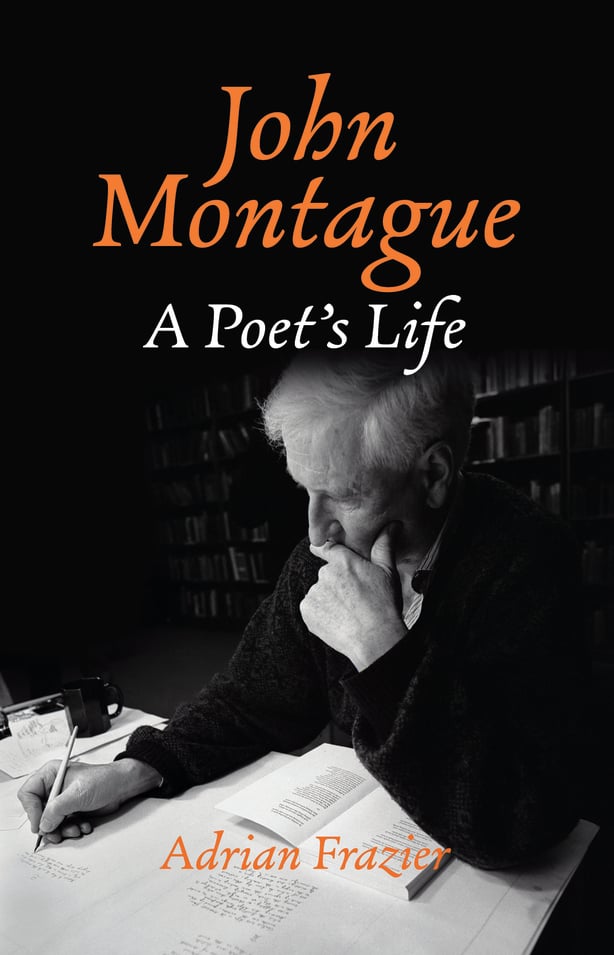We present an extract from John Montague: A Poet's Life, Adrian Frazier's new biography of the celebrated poet, who passed away in 2026 aged 87.
In the late twentieth century, Irish poetry achieved an historic quality, a golden era to compare with the verse of the Elizabethan and the Romantic periods. A Poet's Life is the definitive biography of one of the first and foremost poets in this golden generation, John Montague. Inspired by the examples of Yeats and Joyce, he consciously educated himself to play a central role in the self-understanding of his people.
As the months of summer rolled on, Johnnie was allowed the run of the farm. He would go up with Freda and the little collie to bring the milk cow to the barn. Later, he might walk up alone with the dog and watch over the cattle. Around 1950, when he was beginning to write poetry, he described one of those lonely moments of childhood when he was dreaming by himself. Never published, it reads like a hitherto undiscovered poem by Patrick Kavanagh.
The spot where I lay in the furze bush
And read about spaceships and watched people pass
…
Rattle of lorries on the road passing at night
Dog sitting by the grassy verge in the
twilight The kind of love you feel moving
in the byre
Where the chickens cheep and the hens settle themselves
The light dim in the kitchen from a candle on the sideboard
The ducks quacking in expectation of food.
In all these sounds you have accompaniment.
Soon will be the time of milking and foddering.
A boy alone in the house, he wanted more 'accompaniment' than his dog and the barnyard fowl. Across the Broad Road, he could see Austin Lynch and his brother Gerard. He would like to go barefoot with them on hot days up the Broad Road to Kelly’s shop and get a candy for a halfpenny; he too would like to stick his toes in the bubbling tar. Opposite, there were the rundown stables of Broughan House, a former halt on the Dublin–Derry coach road. It would be fun to climb through those places with the Lynch brothers, or go down to splash in the Garvaghey river.
We need your consent to load this rte-player contentWe use rte-player to manage extra content that can set cookies on your device and collect data about your activity. Please review their details and accept them to load the content.Manage Preferences
Via RTÉ Arena - John Montague: A Poet's Life reviewed
Yet his aunts were slow to let him mingle with the other children in the townland. It was not just that he was too young, or that he did not yet know his way about. They thought him a class above the locals and destined for great things.
Nonetheless, they could not but give him more rope as time went by. Aunt Freda dated his acceptance of Garvaghey as home, and her acceptance of him as a villager, from the time he raced back to the house, late and out of breath, saying he had been ‘keppin’ the cows, who had taken fright because somebody ‘coped’ a cart.
We need your consent to load this rte-player contentWe use rte-player to manage extra content that can set cookies on your device and collect data about your activity. Please review their details and accept them to load the content.Manage Preferences
Watch via RTÉ Archives: Writer In Profile - John Montague
In September he started attending Garvaghey Primary School, up the hill, on the south side of the Catholic church. There is a photograph of the schoolboy dated June 1934, at the end of his first year.
With the black cat in his arms, his curls brushed out and hair parted, he is wearing the woollen short pants, matching jacket with flapped pockets and knee-socks that had come with him from Brooklyn to County Tyrone.

He made a friend at school, a girl, to judge by ‘A Love Present’, a story in which she is called ‘Mary’. He was allowed to play with the children of her family; they owned the new shop at the crossroads. Mary was the eldest and on her account Johnnie accepted as his pals her puffy-faced little brothers. He fancied her swinging pigtails, and teased her, and believed she liked him back. By the time the school inspector made his visit, both were picked out as prize students. The teacher put them through their paces. In the classroom skit, she was Little Red Riding Hood and Johnnie got to play the wolf.
The following school year, Johnnie came down with something in his chest. For a month he was kept at home. The novelty of being sick soon wore off and he waited for a visitor; he waited for Mary. Finally, Freda called upstairs that someone had arrived to see him. He hung over the banister to see if it was Mary. It wasn’t. It was a girl from the back of the class, a child from a labourer’s cottage. She had often waited like a spaniel after school in the hope of talking to him.
‘Tell her to go away,’ the boy cried out.
The grown man saw, in pain, his ‘arrogant, precious little spirit’, the prince of his aunts’ dreams.

John Montague: A Poet's Life is published by Lilliput Press

